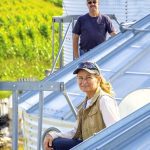U.S. military plans in doubt | Senate rejects aviation biofuel costs
Mounting opposition to U.S. military use of biofuel won’t prevent the jet biofuel industry from taking off in Western Canada, says an expert in the field.
Promoters of the jet biofuel industry and its associated oilseed crops like camelina and carinata often point to the U.S. military’s interest in the alternative fuel as proof of future demand for the product.
The U.S. Department of Defense bought 1.7 million litres of jet biofuel in 2011 and plans to buy more in the coming years. The navy has a goal to meet half of its energy needs with biofuel and other alternative forms of energy by 2020.
Read Also

Ag ministers hear request for regulatory change, more infrastructure development
Canada’s agriculture ministers met today in Winnipeg after postponing their usual July in-person meeting due to wildfires.
So a proposed ban on the military’s use of biofuel could be a big blow for jet biofuel makers.
A bill that would prevent the U.S. military from buying and investing in biofuels that are more expensive than fossil fuels recently passed through the Senate’s armed services committee and was approved by the House of Representatives.
The navy paid $26 US per gallon for jet biofuel in December compared to $4 per gallon for the fossil fuel alternative. It projects it will still be paying a $5.40 per gallon premium for the fuel by 2020.
Mike Cey, vice-president of corporate development with Ag-West Bio, believes this development will have little impact on Western Canada’s fledgling jet biofuel industry.
Ag-West has spent the last 18 months completing a feasibility study on the economics of making jet biofuel from camelina and carinata, two new oilseed crops for the prairie region.
The study indicates there should be strong demand for the fuel in Western Canada.
“That opportunity will continue to exist regardless of what the U.S. military decides to do,” said Cey.
Canada imports about 60 percent of the jet fuel it burns. The shortage is particularly acute in the landlocked Prairies.
“The best opportunity (for jet biofuel) exists where jet fuel is most expensive today and it was indicated to us that happens to be Western Canada,” he said.
One reason jet biofuel is expensive in the United States is the high cost of farmland, which forces farmers to grow only high yield, high value crops.
The U.S. government recently attempted to lure farmers in California and Washington into growing camelina to be purchased by the U.S. military on the West Coast. A rich subsidy program was implemented to entice farmers to grow 50,000 acres of the crop.
“The net result was they got zero signup,” said Cey.
“They’ve got to grow things of much, much higher value than a subsidized camelina program.”
By contrast, Agrisoma Biosciences Inc. was able to contract 8,000 acres of carinata in Saskatchewan and Alberta in its first attempt at commercializing the crop. The program was oversubscribed.
Cey said it is becoming clear that carinata will be the industrial oilseed of choice for Western Canada’s jet biofuel industry. Agrisoma is multiplying enough seed for farmers to plant 100,000 acres of the crop next year.
“I see carinata picking up steam and picking up momentum,” he said.
The feasibility study, which could be released as early as the end of June, will show that there is a gap between the compensation a producer needs for the crop based on today’s varieties and what refiners are willing to pay for the feedstock.
Cey is confident that gap will be closed by the work happening at Genome Prairie.
It is one year into the Prairie Gold project, a three-year, $4.5 million initiative to develop higher yielding lines of camelina and carinata with enhanced oil content.
He recently attended Prairie Gold’s first annual general meeting where he learned that the project is well on its way to achieving its research targets.















